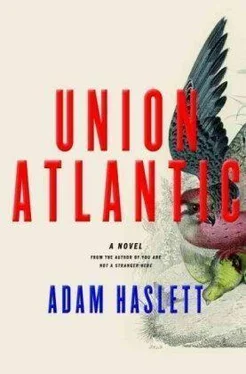How did people bear it? Needing to be saved so appallingly.
“The professor’s right,” Emily shouted. “Kill the ego! Let the world in!”
“Come on,” Jason called, “swim!”
Shedding his bathrobe and draping it on the rail, Hal leaned down to remove his shoes and trousers. His bare back was pale and narrow. A boy’s body, Nate thought, gangly, uncertain, a protector of nothing.
“You coming?” Hal said.
Nate stripped to his briefs and from the bottom step made a shallow dive, his thin form slipping into the water, the day, the drug, all of it, washed for an instant from his mind by the cold rush, gills opening in his chest as he let it all go. Rising again to the surface, his head was encompassed once more by the warm night air as he turned onto his back, a blazing zigzag of starlight pouring into his eyes.
They swam a few feet apart out toward the formal garden, Jason reaching the white balustrade first and lifting himself up to sit on its wide top. Behind him, on a steeply raked hillside, stood the fancifully clipped trees and hedges, topiary in the shapes of cones and boxes, a few cypress intermixed, all of it seen as much from memory as through the layers of shadow covering it now. He helped each of them up in turn and they crossed the path onto the lawn. On a terraced stretch of grass halfway up the rise, they sat, still dripping, beneath the large pyramid of an evergreen, looking back across the lake to the campus and beyond it to the lights of Finden.
“It keeps coming,” Emily said, resting her head on the ground.
“Let it come,” Jason replied. “Just let it come.”
___________
MANY HOURS LATER, after the drug had at last worn off and he’d snuck silently back into his house, Nate undressed in his room and put on an old pair of boxers before brushing his teeth. In the mirror over the sink, he looked scrawny, his arms thin like Hal’s, barely any muscle on his chest and hollows in his shoulders above the collarbone. Nothing, he thought, like the body of the man he’d met that day. None of his thick presence. Lying in bed with the lights off, Nate pictured the man upstairs in that huge house of his, taking off his tie, his pinstripe pants and pressed white shirt, a perfect strength exuded into the perfect dark behind Nate’s eyes, squeezed shut by this waking dream, as he moved his fist up and down on himself, trying hard to fill over the dry silence of the house with the flood of that other, imagined place, shorn of everything but a pleasure so keen it might just have the power to obliterate him. Then, for two or three ecstatic seconds, the obliteration came, its flood receding too quickly, leaving behind the wrecked old world of things as they actually were.
He lay still now. Along the bottom edge of the shade, he could see the faint, bluish tinge of the streetlight. A pile of clothing was dimly visible on the chair in the corner, the spine of a textbook sticking out over the edge of his desk. He closed his eyes again but the fantasy was gone and he was wide awake.
A quarter past nine, the clock on the mantel read. Too early for bed, if Charlotte didn’t want to wake in the dead of night. She took a seat by the open window in the living room, where warm evening air floated across the sill onto her lap and onto the heads of the dogs lying at her feet. She’d run on too long this afternoon with young Nate, carried away on the Works Progress Administration, but she hadn’t been able to help herself.
He had caught her unawares that first day he’d appeared and it had been all she could do to muster an hour’s lesson. As he’d scribbled the occasional note, a familiar pall of uncomprehending boredom had settled over his face like custard. How many times had she seen the like while pacing her classroom, Lincoln’s doleful eyes gazing over the fruit of his more perfect union? Over the years, most students had been baffled by her importuning, her insistence that they see the conditions of their own lives in historical terms. Amidst the general, bovine indifference there had always been a few willing to entertain the notion that the world might consist of more than their uses for it. She hadn’t pegged Nate as one at first.
But now she saw things differently. He attended to her words as if it weren’t only the content that mattered. Toward the end of her years at the school, even her better students had become mere harvesters of fact, unwilling to be transformed by what they might learn. They were closed to that higher ambiguity that came only from observing at close range a person compelled by knowledge, someone who might show by example how one’s first self, illiberally imposed, could be given up in favor of the chosen course. But not this young man. It wasn’t that his few questions had been all that penetrating, and indeed his being impressed by the intruder’s mansion had struck her nearly dumb. But he considered her arguments; he followed the rhythm of her words.
A generosity of attention. That was the heart of it.
You expect us to believe that? Wilkie said, rising to press his nose to the screen, ears perked up like the wings of a bat. Come on now, be honest with yourself .
The boy’s skin, pale like butter; his large brown eyes; the way his hair fell in a wave over his forehead. She’d seen the resemblance early on, but pushed the thought aside. But sitting across from him at the Chinese the other week it made no sense to deny how like a younger Eric he looked.
Oh, here we go , Sam said.
How could she ever think, ever get things clear in her head with the two of them nattering like this?
That afternoon, tutoring Nate, just as an idea was about to take form and escape the eddies of modification and caveat, some tiny fact — ash on the carpet, a strand of ticking loose on the sofa’s arm — had pulsed up bright in front of her, arresting all her forward motion, and she’d floated there, lost, catching the dark sparkle of Sam’s or Wilkie’s eyes, who called out to her, There is no place other than this: welcome , leaving her terrified but determined to resist, to find the current again before it ceased, and so haul from her stalled mind a coherent thought.
But even now as she tried to concentrate, to keep her mind here in the present, memory, like a troubled friend whispering through the screen, brought the image of her old apartment on West Eleventh Street, those two little ground-floor rooms with the paved square of garden at the back, and the two of them bringing in the firewood Eric had found somewhere the day he moved in with her, his father’s old car parked in the rain, the two of them running logs down the steps and into the house, piling them on a blue tarpaulin spread on the living-room floor, the wood dust and strands of bark matted to their coats.
Most of Charlotte’s college friends had met their husbands before graduation or secured them soon after. Boys from Amherst and Williams arriving four or five to a car for the dances at Smith, long evenings of the smallest talk imaginable, the young gentlemen speaking like bad pantomimes of their fathers, all summer holidays and the names of banks, little lords of the financial manor. She’d watched women she’d heard speak eloquently in class of Shakespeare or Rome nod their heads and smile, listening patiently to one blandishment after the next, while the boys glanced about to see what else was available, and it made her feel ashamed for her classmates and for herself. It may have been that the boys didn’t approach her because she didn’t catch their eye, being a bit too tall, neither blond nor pretty in a conventional way, but the defiant expression she wore couldn’t have encouraged them either. If one did strike up conversation, she thought it best to compensate for her classmates’ hiding of their education; she usually started in on an analysis of whatever she was reading that week. A battlement her pride had been, high and safe.
Читать дальше












